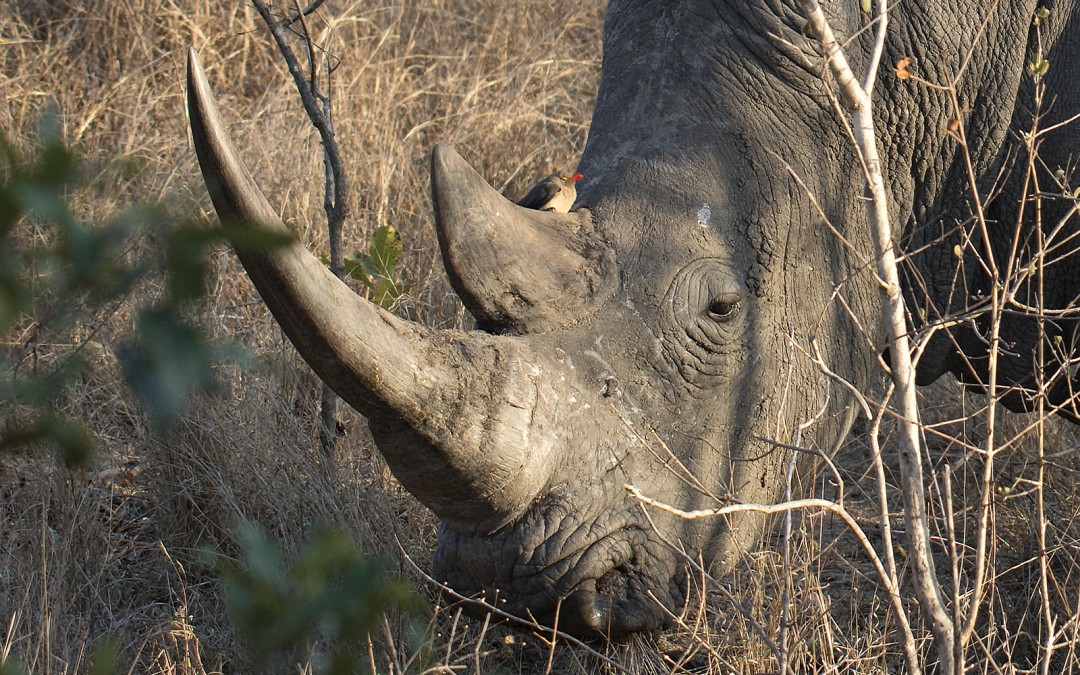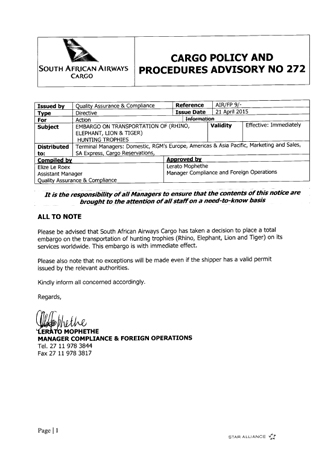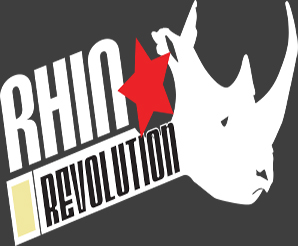A post published by Africa Geographic is suggesting that South African Airways has placed a WORLDWIDE BAN on the transport of Hunt Trophies, even if proper export and import permits are in place.
In what looks to be an internal document, the ban specifically refers to Rhinos, Elephants, Tigers, and Lions which are among the world’s most endangered big-game animals.
By no means am I an environmentalist or tree hugger but after going on a Safari last year, I’ve developed a passion around the protection of endangered animals, especially the Rhino who are at the mercy of poachers throughout Africa. Anytime I see positive developments such as the potential new SAA Cargo policy, I’ll share it in the hopes of bringing additional awareness to the topic.
If in fact this policy is now in place with SAA Cargo, I hope that other airlines follow their lead and adopt similar policies. This looks like a very effective way to put an end to the needless killing of defenseless, endangered animals.





Is this ban still in place with SAA?
The Cecil Lion story sent me to the SCI website.
According to their site, they lobbied to have the ban overturned?!
Left lower column, second story on page
http://www.scifirstforhunters.org
Yes, the SAA bans are in place.
Seriously, DeltaHater? If the slaughter doesn’t have to stop somewhere, than why are so many airlines and now, Hapag-Lloyd shipping, cutting off a profitable segment of their cargo industry to send a message? I’m not in charge of these companies and neither are you, so wake up and smell the roses. The cargo industry is saying that they don’t want to be party to this anymore. They banned it… so your opinion is moot. I am merely applauding the action, which, by the way, is growing.
I hope that the backlash of this embargo is that the hunting industry steps up to counter illegal poaching. They may feel that their legal hunting trophy ban is “throwing the baby out with the bath water.” The message that the airline and shipping cargo companies are sending is this: ” We won’t be party to the wholesale slaughter of these animals and unwittingly transport illegal goods.”
The elephant tusks that were intercepted going through Australia to Kuala Lumpur labelled as machinery parts would have been done intentionally to avoid detection just like drug smugglers do. Like most reasonably minded people I am aware, as it seems is the airline, of the important role trophy hunting plays in African wildlife and habitat conservation but I don’t know how these actions would stop someone doing exactly the same thing tomorrow. I guess it would be hard to detect false documents being used to legally export illegally taken trophies of vulnerable species, so not allowing any of those particular species to be carried would seem to solve that problem for the airline but not really do anything for conservation.
to quote John above ”John on April 26, 2015 at 2:51 am
Your good intentions are misguided. Legal hunters provide money to local residents”
John it is you who is misguided if you think that, Hunting does NOT provide money to local residents here in South Africa, it may provide a few jobs (very poorly paid jobs at that ) but the money goes into the deep pockets and accounts of wealthy game farm owners, Eco tourism/photo safaris generate YEAR ROUND income on a much wider scale. Then there are those that argue that ”but we donate the meat to the ‘poor starving villages” . This is also nonsense, Firstly it is illegal to sell or donate lion meat in South Africa due to the risk of TB and parasitical larvae . Secondly lion meat does not get eaten here, Hunters are only interested in the head and skin of the unfortunate animal. Ever wondered what happens to the bones? the bones usually stay with the breeder, who can then sell the bones, with a government permit, to Asian buyers for use in making lion bone wine.
It’s estimated that a complete lion skeleton can sell for as much as R80 000. (12 US dollars = 1 rand , 18 British pounds = one rand …do the math ) Last year it emerged that over 1 400 lion and leopard trophies were exported from the country in 2009 and 2010. According to the environmental affairs minister, in 2010, 153 live lions were exported as well as 46 lion skins, 235 carcasses, 592 trophies, 43 bodies and 41 skulls. It was noted that these figures were incomplete as the provinces had not yet captured all their data. Yet there was a 150% growth in exports of lion products from 2009 and 2010.
Amplifying an illegal industry. Animals were not put on this planet to satisfy human greed, Hunting is for gutless ego driven cowards,
JP… you are completely misinformed. You are like the guy who accuses a doctor of stabbing a “victim” because he cut open the patient with a scalpel. Do research and learn. (and I don’t even hunt).
Your good intentions are misguided. Legal hunters provide money to local residents and make game animals a valuable resource to be protected. The legal hunters are the ones transporting trophies on airlines not poachers. Poachers have no respect for the animals or the local residents. The elimanition of legal hunting will results in the destruction of the game population in Africa.
I understand your position, but the SAA policy focuses only on 4 animals leaving a lot of others that can still be transported if taken as a trophy. South Africa as a nation has been under a lot of pressure to step up their conservation efforts to keep something like Lions and Elephants OFF the endangered lists….There are still dozens of animals that can be hunted and should be hunted to maintain balance in the ecosystem, but I can’t see why a Lion, Tiger, Elephant or Rhino need to hang on someone’s wall when there are so few to begin with….I hunt where I live, so I see the hunters perspective as well, but in the case of rare game animals that are harvested simply for pride and egos, it makes little sense to take their lives.
This is terrific news. The slaughter has to stop somewhere.